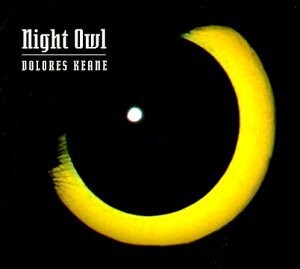 Dolores Keane has been called “the voice of Ireland,” and has received numerous awards and accolades in a career spanning a quarter of a century with De Dannan and on her own. Night Owl, which has been available in Norway and Ireland for a couple of years, now is available in the U.S.A. It’s a splendid collection of 12 songs, five of them traditional and seven contemporary. Several of them were written by Keane’s long-time collaborator John Faulkner, who produced the disc, plays guitar and sings harmony vocals.
Dolores Keane has been called “the voice of Ireland,” and has received numerous awards and accolades in a career spanning a quarter of a century with De Dannan and on her own. Night Owl, which has been available in Norway and Ireland for a couple of years, now is available in the U.S.A. It’s a splendid collection of 12 songs, five of them traditional and seven contemporary. Several of them were written by Keane’s long-time collaborator John Faulkner, who produced the disc, plays guitar and sings harmony vocals.
The songs on Night Owl are mostly slow, low-key numbers, well-suited to Keane’s warm, expressive and textured alto. One of the highlights is a gorgeous rendition of the traditional “Wind that Shakes the Barley.” Keane sings this lamenting love song with a quiet but intense passion, backed by a simple arrangement of guitar, mandola and bass, plus uilleann pipes and tastefully restrained synth-strings on Gavin Povey’s keyboard.
“Barley” is a good choice as the second track, following the emotionally intense “Dangerous Dance,” Peter O’Hanlon’s song about The Troubles. The trad numbers, and ample liner notes by Faulkner, add up to a mini-history lesson, including “Dunlavin Green” about the execution of several members of the United Irishmen in 1798, and “The Banks of the Nile,” about a young Irish man forced to leave his lover to fight for the English against Napoleon in Egypt.
Another strain running through Night Owl is the sundering of families and lovers by emigration. One of these is “Ballyroan,” a lament by Thomas Hodge, a teacher who emigrated to America in the 19th Century. It has one of the prettiest lines I’ve heard in all my days: “The purling rill that runs the mill, through hazel shades runs down…” The combination of poetic lyrics, Keane’s delivery, and the simple backing of guitar, harmonium and whistle, make this an achingly lovely song.
Another emigration song is the contemporary “Make Me Want to Stay” by Tommy Sands. It’s a much simpler ballad, with more complex orchestration.
A lot of Celtic music treads perilously close to over-sentimentality. The only track on Night Owl that approaches that description is Faulkner’s and Povey’s “Jose,” about a street urchin in Sao Paulo, Brazil. But overall, Keane’s latest release is excellent, a work of quiet passion and beauty.
(Alula, 2000)
